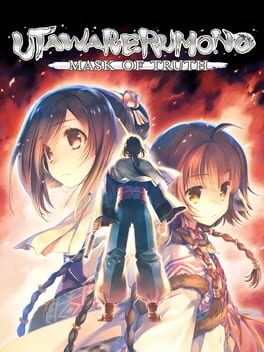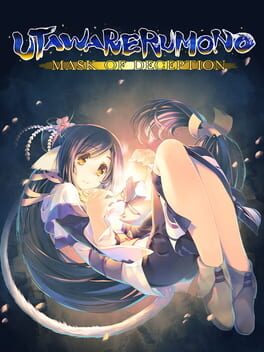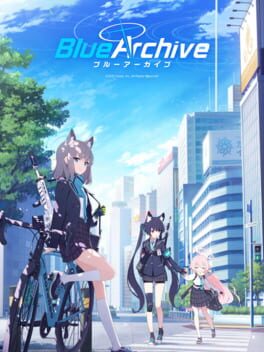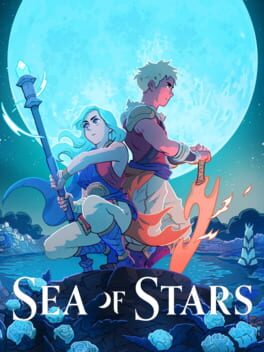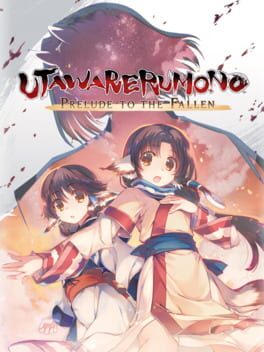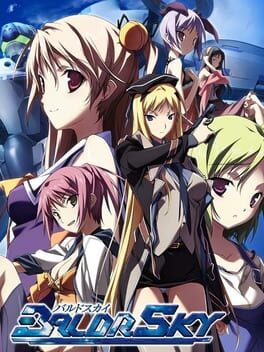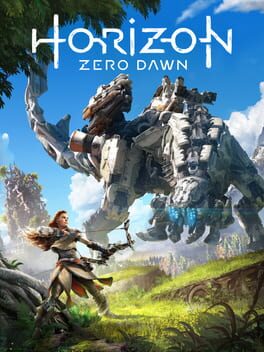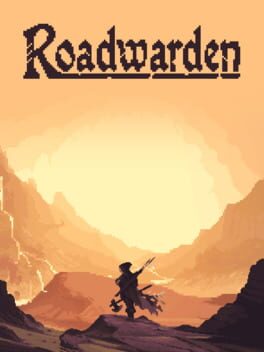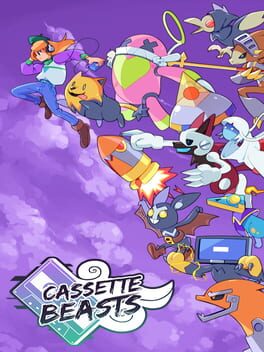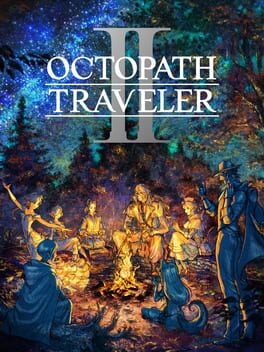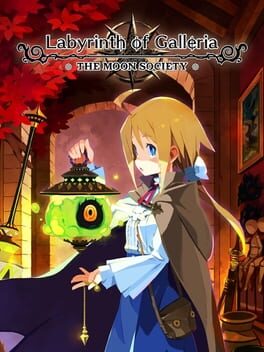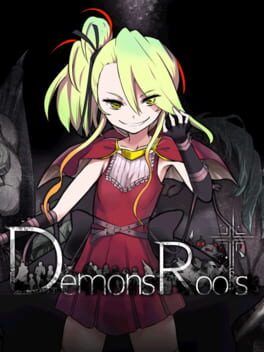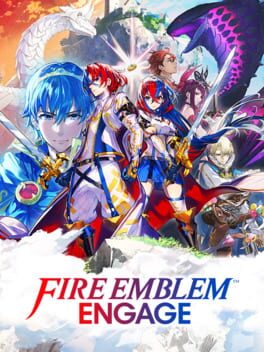ContessaKoumari
I have too many disparate thoughts about Utawarerumono to really sort through, and I don't think its a perfect game either as an srpg or as a narrative, but what it does it just does so well. Its a game relatively without guile, it isn't trying to be smarter than its reader--but it still wants you to ponder, to think on the emotion. Unlike the first two games, there's a creeping sense of dread even during the slow parts of the game here--you know the happy days will come to an end, and every single piece of setting is tinged with that. And when war finally comes, it executes it quite well with wonderful if somewhat stock characters.
I loved how frank it can be with its emotion sometimes--characters like Atuy or Rulutieh who otherwise would be cast-off in other series here get really strong characterization and thought among the melancholy and joy, and more than most you can just see how much they grow. Haku and Kuon are of course the main stars, and they don't disappoint either, but this to me is such an achievement of the writing of the 2010s and why all those series built in a similar vein as this work.
Its also the very rare trans-positive homophobic series, which is funny in its own way.
I loved how frank it can be with its emotion sometimes--characters like Atuy or Rulutieh who otherwise would be cast-off in other series here get really strong characterization and thought among the melancholy and joy, and more than most you can just see how much they grow. Haku and Kuon are of course the main stars, and they don't disappoint either, but this to me is such an achievement of the writing of the 2010s and why all those series built in a similar vein as this work.
Its also the very rare trans-positive homophobic series, which is funny in its own way.
Rating Mask of Deception on its own is kind of a joke since this is very clear "part one of two" and not meant to stand on its own merits. That being said, it continues to be a really fun chill visual novel mixed with subpar somewhat tedious srpg gameplay like the first game. Much like the first game, it is incredibly of its time. This game could only have been written and released in 2015, the characters and plots are all pastiches of that specific post-sao pre-isekai era of anime and it just feels dated if not bad now. Or at least, I liked that aspect of the original and I'm glad it continued here.
The one part I'd say is really funny is that builds off that is one of the characters is a gay spymaster and this was really the only point in time in otaku culture where you could write a scene where he sexually tortures an opposing spy and not have it be played as a joke. If it was written any more modern, they would have not written the scene for fear of pissing people off, and if it was written any earlier the whole thing would be a very distasteful gag. Funny how that works.
The one part I'd say is really funny is that builds off that is one of the characters is a gay spymaster and this was really the only point in time in otaku culture where you could write a scene where he sexually tortures an opposing spy and not have it be played as a joke. If it was written any more modern, they would have not written the scene for fear of pissing people off, and if it was written any earlier the whole thing would be a very distasteful gag. Funny how that works.
2021
(review as the of the end of volume Final)
A game I completely discounted on release, Blue Archive is a perfect example of how gacha soshage have really taken the torch from the 00s/10s eroge scene. Of course, this has been the direction the space has taken since Fate/Grand Order's raucous success, but this one to me feels like the moment. Its hard for me at least to discuss the game except in comparison to its main two competitors in the Story Gacha, FGO and Arknights. Those games I often feel--as great as they are--get away from themselves, with their grand stories and rotating casts often running away from the presentation of the plot--if I was a smarter person, perhaps I'd make some reference to how Grand the scale of those games are and how the small phone screen ill-suits them, but I am not a philosopher.
Blue Archive keeps it simple. Its a game downright obsessed with the small, every day--even the most minor cursory thoughts about how Kivotos as a place works makes the whole thing crash down, but that same small nature just makes it work better for the phone format. I could easily shotgun entire chapters of Blue Archive while at work in a way I struggle to with FGO or (especially) Arknights. The focus on the more day-to-day "nichijou-kei" sort of writing helps this as well, I think.
But all of that would be missed if the writing wasn't up to par, which is where Blue Archive shines. The game's so endearingly optimistic and even the bit characters have too much charm that you can't not love them and buy into their struggles or lackthereof. It even made one of the worst character types--the person who Talks Only In Video Game References--arguably the best, most realized character in the game. The plots themselves can get quite grand in scale--be it Ancient Blood Feuds or Literally The End of Existence of Every Dimension Ever--but they never stop focusing on these girls, and your role in helping them overcome their various traumas, quirks, feelings, or whatever.
Which is where I should put my subnote--yes, the premise is that you're the good-hearted sensei who teaches these girls, and yes they are all very voluptuous and a lot of them definitely do want to jump your bones--but I was honestly shocked by how wholesome the whole game is. Its horny in practice, but in spirit? I'm not as convinced.
I actually really liked how far it takes the teacher conceit--although your character does take definitive action in the stories, it always comes from a place of growth for the girls you are helping. It has a lot of emphasis on how part of the reason Kivotos as a place is fucked is because the world ultimately does not help these girls and there's no mentorship, no people helping them out except themselves--this is exemplified by all the main antagonists being pretty explicit metaphors for methods of control and coercion of the adults these girls should be able to trust and rely on(and, mechanically, this is also tied in by the main character's Otona no Card--literally, adult card, translated into english as your credit card, an object that the other antagonists who are adults should have but don't because they don't accept that responsibility to the students). And that sort of sense of, I don't know, fulfillment? , is what makes the whole plot work.
And its beautiful.
As to the game? Its a passable idle game i guess, but who really cares about that.
A game I completely discounted on release, Blue Archive is a perfect example of how gacha soshage have really taken the torch from the 00s/10s eroge scene. Of course, this has been the direction the space has taken since Fate/Grand Order's raucous success, but this one to me feels like the moment. Its hard for me at least to discuss the game except in comparison to its main two competitors in the Story Gacha, FGO and Arknights. Those games I often feel--as great as they are--get away from themselves, with their grand stories and rotating casts often running away from the presentation of the plot--if I was a smarter person, perhaps I'd make some reference to how Grand the scale of those games are and how the small phone screen ill-suits them, but I am not a philosopher.
Blue Archive keeps it simple. Its a game downright obsessed with the small, every day--even the most minor cursory thoughts about how Kivotos as a place works makes the whole thing crash down, but that same small nature just makes it work better for the phone format. I could easily shotgun entire chapters of Blue Archive while at work in a way I struggle to with FGO or (especially) Arknights. The focus on the more day-to-day "nichijou-kei" sort of writing helps this as well, I think.
But all of that would be missed if the writing wasn't up to par, which is where Blue Archive shines. The game's so endearingly optimistic and even the bit characters have too much charm that you can't not love them and buy into their struggles or lackthereof. It even made one of the worst character types--the person who Talks Only In Video Game References--arguably the best, most realized character in the game. The plots themselves can get quite grand in scale--be it Ancient Blood Feuds or Literally The End of Existence of Every Dimension Ever--but they never stop focusing on these girls, and your role in helping them overcome their various traumas, quirks, feelings, or whatever.
Which is where I should put my subnote--yes, the premise is that you're the good-hearted sensei who teaches these girls, and yes they are all very voluptuous and a lot of them definitely do want to jump your bones--but I was honestly shocked by how wholesome the whole game is. Its horny in practice, but in spirit? I'm not as convinced.
I actually really liked how far it takes the teacher conceit--although your character does take definitive action in the stories, it always comes from a place of growth for the girls you are helping. It has a lot of emphasis on how part of the reason Kivotos as a place is fucked is because the world ultimately does not help these girls and there's no mentorship, no people helping them out except themselves--this is exemplified by all the main antagonists being pretty explicit metaphors for methods of control and coercion of the adults these girls should be able to trust and rely on(and, mechanically, this is also tied in by the main character's Otona no Card--literally, adult card, translated into english as your credit card, an object that the other antagonists who are adults should have but don't because they don't accept that responsibility to the students). And that sort of sense of, I don't know, fulfillment? , is what makes the whole plot work.
And its beautiful.
As to the game? Its a passable idle game i guess, but who really cares about that.
2023
The bottom line is that Sea of Stars is an ultimately mediocre title that manages to cobble together its form by stealing things from a dozen other, older, better titles. Each thing it steals is implemented worse than the game it steals from, but still good enough to not be bad. The act of playing the game is fine. It's Fine. It is the ultimate definition of Mid. Mid of Stars.
To list all this game's faults on a lower level than "wow it looks pretty" would to be sit here all day, but I can't help but go over some of the biggest issues I had during my time with it.
The first and foremost is the writing and plot--the plot by itself is pretty standard, just your basic "go kill the demon king" storyline when you get down to it, but its building off lore from a game pretty notorious for having nonsense lore(The Messenger) so it ends up being nonsense here as well--none of the worldbuilding details or twists really ever land because you never get the sense that this world is anything more than levels in a video game. There's like maybe five actual towns in the game, for gods sake. This is compounded by the character writing that manages to be completely uninteresting at best, and positively dreadful at worst. The worst of it is a major side-character in act 1 that speaks exclusively in video game references, who basically ruins every scene she is in and kill what little pathos there can be in this game. Once she steps aside, it gets a little better and I'd even say act 2 cooks for a short time, but then they do the very bold decision to put the only two characters with any sort of internality on a bus until literally the final boss door. Its frustrating. That's not to speak of the other issue with the game not respecting itself, every scene that gets a little tropey immediately gets a Marvel quip to kill any tension and remind you you're seeing scenes played out in a dozen older games with way more self-respect. It sucks.
Then, there's the game pacing. As mentioned, the game has I think six actual "towns" in it, and you only visit each of them at a single point in your journey which means you consistently go 4+ dungeons at a time without any "downtime" where you can sidequest, play minigames, talk to npcs etc. They completely missed the memo on the "vibes" of a jrpg in spite of aping these games so hard--those points where you're just sort of idly walking around town are important and this game just doesn't have any of that. This is compounded by what I'd call location issues--backtracking even after you get to the end of the game with all movement options is painful, consistently involving traversing old dungeons or going through two-three extra screens to get to where you need to go, so the game actively disincentivizes you from trying to do anything besides progress the main quest.
The actual gameplay is split into two--puzzle dungeons generously described as "Crosscode but worse" and combat described as "Mario RPG but worse", double-hampered by piss-easy difficulty. Like, this game has 8 different accessibility options but I struggle to find how anyone would need them when the game difficulty is toggled so low.
Which sucks, because the one place the game excels in is the economy/item management, you have a very limited inventory that heavily incentivizes consumable usage, and also the gold is a really tight resource that you have to manage. In theory, this is great and adds an attrition factor the long dungeon dives mentioned earlier--in practice, the difficulty tuning being so low means you never interact with those systems because you can easily go through the game never using consumables which means you can sell all the crafting supplies for a surplus of money.
Even the OST manages to not really be striking, like its perfectly serviceable but I never really found myself humming a tune or getting hyped by a song. Its just, rpg music. You could replace it with the rpgmaker default soundpack and I think the experience would have been exactly the same.
And yet, in spite of all this, I still finished the game including the true ending that demands like 95% completion because it was juuuust that not bad enough that I could sunk cost fallacy my way through it.
The final thing I'd leave you with that speaks to the shoddy nature of the game is the opening--after the framing device, the game opens with our new heroes going off to their first mission. You fight exactly one tutorial battle vs a goblin, then it forces you into a flashback where you see their backstory. This last an hour and leads up to exactly the beginning of the game. Why did they have the flashback? Why would you not just start the game from the backstory sequence? Its the sort of thing literally any editor would notice and rectify immediately.
Truly, the Mid of Stars.
To list all this game's faults on a lower level than "wow it looks pretty" would to be sit here all day, but I can't help but go over some of the biggest issues I had during my time with it.
The first and foremost is the writing and plot--the plot by itself is pretty standard, just your basic "go kill the demon king" storyline when you get down to it, but its building off lore from a game pretty notorious for having nonsense lore(The Messenger) so it ends up being nonsense here as well--none of the worldbuilding details or twists really ever land because you never get the sense that this world is anything more than levels in a video game. There's like maybe five actual towns in the game, for gods sake. This is compounded by the character writing that manages to be completely uninteresting at best, and positively dreadful at worst. The worst of it is a major side-character in act 1 that speaks exclusively in video game references, who basically ruins every scene she is in and kill what little pathos there can be in this game. Once she steps aside, it gets a little better and I'd even say act 2 cooks for a short time, but then they do the very bold decision to put the only two characters with any sort of internality on a bus until literally the final boss door. Its frustrating. That's not to speak of the other issue with the game not respecting itself, every scene that gets a little tropey immediately gets a Marvel quip to kill any tension and remind you you're seeing scenes played out in a dozen older games with way more self-respect. It sucks.
Then, there's the game pacing. As mentioned, the game has I think six actual "towns" in it, and you only visit each of them at a single point in your journey which means you consistently go 4+ dungeons at a time without any "downtime" where you can sidequest, play minigames, talk to npcs etc. They completely missed the memo on the "vibes" of a jrpg in spite of aping these games so hard--those points where you're just sort of idly walking around town are important and this game just doesn't have any of that. This is compounded by what I'd call location issues--backtracking even after you get to the end of the game with all movement options is painful, consistently involving traversing old dungeons or going through two-three extra screens to get to where you need to go, so the game actively disincentivizes you from trying to do anything besides progress the main quest.
The actual gameplay is split into two--puzzle dungeons generously described as "Crosscode but worse" and combat described as "Mario RPG but worse", double-hampered by piss-easy difficulty. Like, this game has 8 different accessibility options but I struggle to find how anyone would need them when the game difficulty is toggled so low.
Which sucks, because the one place the game excels in is the economy/item management, you have a very limited inventory that heavily incentivizes consumable usage, and also the gold is a really tight resource that you have to manage. In theory, this is great and adds an attrition factor the long dungeon dives mentioned earlier--in practice, the difficulty tuning being so low means you never interact with those systems because you can easily go through the game never using consumables which means you can sell all the crafting supplies for a surplus of money.
Even the OST manages to not really be striking, like its perfectly serviceable but I never really found myself humming a tune or getting hyped by a song. Its just, rpg music. You could replace it with the rpgmaker default soundpack and I think the experience would have been exactly the same.
And yet, in spite of all this, I still finished the game including the true ending that demands like 95% completion because it was juuuust that not bad enough that I could sunk cost fallacy my way through it.
The final thing I'd leave you with that speaks to the shoddy nature of the game is the opening--after the framing device, the game opens with our new heroes going off to their first mission. You fight exactly one tutorial battle vs a goblin, then it forces you into a flashback where you see their backstory. This last an hour and leads up to exactly the beginning of the game. Why did they have the flashback? Why would you not just start the game from the backstory sequence? Its the sort of thing literally any editor would notice and rectify immediately.
Truly, the Mid of Stars.
2020
The best content is at the start, but it stays consistently Good all the way through. The ending is a bit of a sputter without much fanfare, which honestly reduces the vibes of the set, but all the way til Act 2 its on like 10/10 level. The combat is janky and a bit slow, but its a crpg based off D&D so that's to be expected.
What I missed most, and what crpgs really need to learn from the japanese comrades, is presentation. So many cutscenes in this game just lose their luster through presentation via the in-game engine and really poor direction/camera. The best aspect the current style has is in the mocap--anything revolving around the companions stories excels due to this, and those sidestories are consistently the best content in the game(shoutouts specifically to Lae'zel and Asterion, who have great character arc with the plots that extract true pathos from the characters involved).
Altogether definitely an Achievement of a game, but not necessarily a epoch-inducing game some would have you perceive. As a narrative experience, it fails to many other games this year and the jank around the edges just doesn't feel good most of the time--shoutouts to how like 60% of the final bosses can be yeeted off a cliff though, thats fun.
What I missed most, and what crpgs really need to learn from the japanese comrades, is presentation. So many cutscenes in this game just lose their luster through presentation via the in-game engine and really poor direction/camera. The best aspect the current style has is in the mocap--anything revolving around the companions stories excels due to this, and those sidestories are consistently the best content in the game(shoutouts specifically to Lae'zel and Asterion, who have great character arc with the plots that extract true pathos from the characters involved).
Altogether definitely an Achievement of a game, but not necessarily a epoch-inducing game some would have you perceive. As a narrative experience, it fails to many other games this year and the jank around the edges just doesn't feel good most of the time--shoutouts to how like 60% of the final bosses can be yeeted off a cliff though, thats fun.
A game that starts and finishes strong. Utawarerumono is interesting because its so clearly split in two--there are the peaceful days of living out comfy life with you family of animalpeople, but war is always lurking and you must venture out to defend the peaceful life you have. This structure carries all of Utawarerumono and typically is where it is the strongest--all the little lazing subplots with the various friends and family Hakuowlo care's for are consistently cute and fun in spite of how dated some of the material is here, and even the the eroge roots the game has are played well.
It falls apart in the middle of the game though, where you go on these long war campaigns that are largely pointless outside making sure you keep your srpg skills up to date. I know someone's gonna say "but war is pointless!" and if it played on that I would agree, but in the context of the narrative and themes its basically full filler.
I liked it.
It falls apart in the middle of the game though, where you go on these long war campaigns that are largely pointless outside making sure you keep your srpg skills up to date. I know someone's gonna say "but war is pointless!" and if it played on that I would agree, but in the context of the narrative and themes its basically full filler.
I liked it.
2019
A decidedly medium shooter stymied by tacked on rpg and live service elements that is also about 3 hours too long for its premise. The map design is among the worst I've ever seen in a video game, the gunplay is broken in a funny way, they clearly ran out of money for the last stretch of the game, but the setting is fun enough it roughs over a lot of that.
I can see why if you've only played like, Call of Duty and Diablo your entire life you'd think this was revolutionary. It's not though.
I can see why if you've only played like, Call of Duty and Diablo your entire life you'd think this was revolutionary. It's not though.
2019
The more gameplay-focused eroge tend to suffer on the gameplay side, but Baldr Sky is one of the few that actually had a sick loop. Reading the story made me want to fight guys more, and fighting guys made me want to read the story more--both parts are in harmony in a way. I wish I was good at the game tho.
Not to mention, the story on display here is just wonderful. Its fairly hard scifi with a military stint to it, but it never manages to lose the compassion and sentimentality, the human element is always at the center even when characters are talking in paragraphs exclusively comprised of technobabble.
The way it tackles its Big Ideas like AI, the connection of our net personas and our real selves, what it means to be human and all that jazz that has been done so many times before also manages to come off as novel and unique, with perspectives so very rarely really seen in the genre.
Just a wonderful game, really.
Not to mention, the story on display here is just wonderful. Its fairly hard scifi with a military stint to it, but it never manages to lose the compassion and sentimentality, the human element is always at the center even when characters are talking in paragraphs exclusively comprised of technobabble.
The way it tackles its Big Ideas like AI, the connection of our net personas and our real selves, what it means to be human and all that jazz that has been done so many times before also manages to come off as novel and unique, with perspectives so very rarely really seen in the genre.
Just a wonderful game, really.
2017
There is something to like here, the combat actually plays out in a really interesting monster hunter sort of way with a shockingly brutal lack of iframes and long combat animations, it makes taking down the behemoths feel good and an achievement when you do. But, its all in service to an incredibly poor script--legit I'm shocked Sony would sign off on a writing this poor for a flagship title--and just a cookie-cutter openworld game no different from Assassin's Creed over a decade ago. I got to Meridian and I was already tired of all this shit.
2022
2023
An alright to pass the weekend.
I generally hate """wholesome""" vibe games, and this got dangerously close to being too much--we get it, you added the dog companion so you could be noticed by the "can you pet the dog" twitter account, its dumb. But it reigned it in when it mattered, and there was enough to like I found myself enjoying it mostly.
The monster fighting mechanics are well thought-out until you reach lategame and can basically build your own WMD to one-shot everything in the game on turn 0. I don't really have any complaints really about the combat except that it makes the same cardinal sin pokemon does--having way too many animations in combat that slow down the game. This game has a focus on status conditions, and a single attack will look like "You used Attack" (animation) "It deals damage" (health bar animation) "inflict status condition" (animation) (repeat for each status) (repeat for each attack). Unlike pokemon, you can't even turn off animations so its doubly egregious.
The main issues I have primarily concern the game progression. It's a pretty open-ended game in the sense that they give you two main questlines at the start and you're more or less allowed to explore the world at your leisure to find the macguffins, but in doing so they made traversing the world just...awkward? The physics are off is the best way to explain it, it just feels weird to jump and glide all over the world. My character would routinely clip up an awkward piece of geometry or randomly gain a bunch of height in the air, or lose grip when climbing a wall unexpectedly--its never enough to be a game-killer or outright annoying, but just feel bad. The decision to make sprinting cost an inordinate amount of stamina early contributes, because the animation when your stamina bar depletes completely locks you in place for a second so you're sort of forced to walk everywhere for the first half of the game.
For a game to hinge itself around careful exploration and then make the exploration janky hurts a lot, I won't lie.
The narrative is sort of whatever, its a very vibes-based sort of thing, but the vibes weren't immaculate or horrid. Just sort of generally pleasant. I really liked the sorta lo-fi punk vibe to the ost and the full vocal themes were a treat overall. Also easily the most British game I've played in a while. Take that as you will.
I dunno, like I said its clearly a target of the whole dumb wholesome movement with a dash of 80s/90s nostalgia that is a little overplayed but not done poorly. Its fine, its fun, its executed solidly, but it also won't stick with me.
My favorite monster was Apocrowlype.
I generally hate """wholesome""" vibe games, and this got dangerously close to being too much--we get it, you added the dog companion so you could be noticed by the "can you pet the dog" twitter account, its dumb. But it reigned it in when it mattered, and there was enough to like I found myself enjoying it mostly.
The monster fighting mechanics are well thought-out until you reach lategame and can basically build your own WMD to one-shot everything in the game on turn 0. I don't really have any complaints really about the combat except that it makes the same cardinal sin pokemon does--having way too many animations in combat that slow down the game. This game has a focus on status conditions, and a single attack will look like "You used Attack" (animation) "It deals damage" (health bar animation) "inflict status condition" (animation) (repeat for each status) (repeat for each attack). Unlike pokemon, you can't even turn off animations so its doubly egregious.
The main issues I have primarily concern the game progression. It's a pretty open-ended game in the sense that they give you two main questlines at the start and you're more or less allowed to explore the world at your leisure to find the macguffins, but in doing so they made traversing the world just...awkward? The physics are off is the best way to explain it, it just feels weird to jump and glide all over the world. My character would routinely clip up an awkward piece of geometry or randomly gain a bunch of height in the air, or lose grip when climbing a wall unexpectedly--its never enough to be a game-killer or outright annoying, but just feel bad. The decision to make sprinting cost an inordinate amount of stamina early contributes, because the animation when your stamina bar depletes completely locks you in place for a second so you're sort of forced to walk everywhere for the first half of the game.
For a game to hinge itself around careful exploration and then make the exploration janky hurts a lot, I won't lie.
The narrative is sort of whatever, its a very vibes-based sort of thing, but the vibes weren't immaculate or horrid. Just sort of generally pleasant. I really liked the sorta lo-fi punk vibe to the ost and the full vocal themes were a treat overall. Also easily the most British game I've played in a while. Take that as you will.
I dunno, like I said its clearly a target of the whole dumb wholesome movement with a dash of 80s/90s nostalgia that is a little overplayed but not done poorly. Its fine, its fun, its executed solidly, but it also won't stick with me.
My favorite monster was Apocrowlype.
2023
What I came out of from this game was, I really want an Octopath game with a serious, real writer. More than any other recent rpg I can think of, this game really encourages you to play with its systems and worlds in creative ways and it rewards you for it. There is always something over that hill, past that door, and that's what carries the game through the early and mid sections.
The stories of the travelers themselves range from dull to deranged. Partitio's in particular is this absolutely bonkers random events plot about building shopping malls to abolish the concept of intellectual property(I'm not joking) and its so good just because you never know what the fuck is happening next. The one narrative thing the game does well is the "hype moments", all the travelers get their moment to shine, their cool little boss battle moments(Agnea, who has the least interesting story, has the best one). And it all wraps together in a way that is executed well for as well-played the tropes are.
Which I guess is the problem and why I can't put more heart into the game. Its the perfect example of a game where the game is just missing that ambition, that bit of magical quality to elevate from "pretty good" to "greatest of all time". I think if they hired a more ambitious writer, or went harder in the ludonarrative aspects of the gameplay, they could get there--the team has the talent, clearly.
Still, its a massive step up from Octopath 1 and that is worth applauding. Fun game.
The stories of the travelers themselves range from dull to deranged. Partitio's in particular is this absolutely bonkers random events plot about building shopping malls to abolish the concept of intellectual property(I'm not joking) and its so good just because you never know what the fuck is happening next. The one narrative thing the game does well is the "hype moments", all the travelers get their moment to shine, their cool little boss battle moments(Agnea, who has the least interesting story, has the best one). And it all wraps together in a way that is executed well for as well-played the tropes are.
Which I guess is the problem and why I can't put more heart into the game. Its the perfect example of a game where the game is just missing that ambition, that bit of magical quality to elevate from "pretty good" to "greatest of all time". I think if they hired a more ambitious writer, or went harder in the ludonarrative aspects of the gameplay, they could get there--the team has the talent, clearly.
Still, its a massive step up from Octopath 1 and that is worth applauding. Fun game.
I hate disgaea. The dungeon crawling in this game is super rewarding and fun, be it the hand-crafted levels or the mad rush of the procedural ones, it does a good mix and keeping you on your toes and getting into the flow state. It's a shame its also a disgaea game with its like ten pointless character progression systems and generally useless way of making you have 40 dudes to do those 10 systems on. That part is not fun. The lack of QOL with the battle system also increases this, to the very end of the day I had no idea what was actually going on in most battles because there was no way to tell what was going on, or what the enemy was doing when they did action X or Y. One late-game grinding enemy would sometimes cast the same spell and instakill some of my dudes, and sometimes do nothing, and it wasn't because the spell was rng I think. Just baffling design.
Otherwise, its a very exciting story that falters only slighty in tone and writing juuust at the end. I don't even hate the way it took the ending or post-ending stuff, I like the thought of it. Just executed a bit poorly. What stuck out to me the most was the sort of quiet emotionalism of the writing. The game is really good at drawing feelings out of you in its scenes, it recognizes that people are often irrational horrible people but also sometimes...maybe not, in a good way.
It's also not afraid to take on heavy topics, but with a light enough flair to not feel lurid or casualizing. Watching Nachiroux deal with her very real teenage problems like loving her mom but also hating to be around her due to reasons she struggles to say aloud, or how she's trying to relate to another girl who has so many of her own issues that she struggles to communicate her thoughts is wonderful and all too real. Eureka is no slouch either, she has her own big ball of Issues that her airheaded optimism only just barely conceal from going out of control. It's hard not to love them as you watch them go through the labyrinthine plot so much larger and also smaller than the both of them. I felt it stumbled just a little at the finish mark, where it really felt like the writer's ambition got the best of them juuust a little, but not enough to meaningfully take away from.
Altogether, probably Nippon Ichi's best game, but that's damning it with faint praise because what is there of Galleria is very good, and the things I don't like about it are more the things you get with the studio.
Otherwise, its a very exciting story that falters only slighty in tone and writing juuust at the end. I don't even hate the way it took the ending or post-ending stuff, I like the thought of it. Just executed a bit poorly. What stuck out to me the most was the sort of quiet emotionalism of the writing. The game is really good at drawing feelings out of you in its scenes, it recognizes that people are often irrational horrible people but also sometimes...maybe not, in a good way.
It's also not afraid to take on heavy topics, but with a light enough flair to not feel lurid or casualizing. Watching Nachiroux deal with her very real teenage problems like loving her mom but also hating to be around her due to reasons she struggles to say aloud, or how she's trying to relate to another girl who has so many of her own issues that she struggles to communicate her thoughts is wonderful and all too real. Eureka is no slouch either, she has her own big ball of Issues that her airheaded optimism only just barely conceal from going out of control. It's hard not to love them as you watch them go through the labyrinthine plot so much larger and also smaller than the both of them. I felt it stumbled just a little at the finish mark, where it really felt like the writer's ambition got the best of them juuust a little, but not enough to meaningfully take away from.
Altogether, probably Nippon Ichi's best game, but that's damning it with faint praise because what is there of Galleria is very good, and the things I don't like about it are more the things you get with the studio.
2021
Who gets to write history, but the victors?
At the end of the day, this is the question Demons Roots asks, broadly, and takes it to its very clear thematic end. There are very few pieces of media that have such a clean and well-directed through-line, and for one to be an rpgmaker ero game is actually incredible. I don't mean that as damned faint praise either, because I respect the hell out of rpgmaker eroge developers.
I don't know, I'm not good at writing things. Demons Roots is legit the best JRPG I've ever played, that's all I can say. No one will ever play it because its a torture eroge, but it has so much to say, so much love to share(dont make a stupid joke), it has a soul that is so rare in this world of fiction. If you can get past the content, please play this game--you will be rewarded.
At the end of the day, this is the question Demons Roots asks, broadly, and takes it to its very clear thematic end. There are very few pieces of media that have such a clean and well-directed through-line, and for one to be an rpgmaker ero game is actually incredible. I don't mean that as damned faint praise either, because I respect the hell out of rpgmaker eroge developers.
I don't know, I'm not good at writing things. Demons Roots is legit the best JRPG I've ever played, that's all I can say. No one will ever play it because its a torture eroge, but it has so much to say, so much love to share(dont make a stupid joke), it has a soul that is so rare in this world of fiction. If you can get past the content, please play this game--you will be rewarded.
2023
This game gives you a unit with Warp+massive nuke and another unit with +5 movement usually, and they're some of the weakest emblems in the game.
A return to form for Fire Emblem, easily the most difficult its ever been outside bullshit like Lunatic+ Awakening, but also so devilishly fun. The game gives you so many tools to play with that its easily "broken", but the game makes you fight broken stuff too so it works.
Like, the best chapter in the game(and a contender for best SRPG level of all time) is a midgame map with the objective "Kill 6 bosses". On Maddening, the map took me 4 hours to strategize through. It was wonderful.
For fans of ludonarrative shit, you got that here too. It takes the whole concept of "superpower modes" and plays with it in so many ways, shit like Chapter 11 or Chapter 17 or Chapter 22 or even the endgame just blew my brain with their creativity in using the ring mechanic effectively both from a fun game level but also narrative funciton.
I don't really feel the need to sell the gameplay anymore, besides it was just stellar. But what I didn't realize as I played was how invested I got. A common point people have said is that the storytelling is bad or lame, and I'll grant that the beginning of the game is poorly paced and staged from that angle. It introduces the weakest characters early, but as you filter into the midgame and get the more interesting cast I found it good. At least on level with the other nu-FEs. The overall story is very straightforward, but thats fine--its an anniversary sentai game--but it managed to get me with some emotional moments and the support conversations were just as good as any nu-FE convos.
The only sad thing is that there's going to be a bit of Persona v SMT going on now. Three Houses brought in a lot of people to the series, for better or worse, with its dull structure. But thats never been what FE was about, and us oldheads will just have to remember and hope that the positive reviews of this game work it out.
Anyways, Fire Emblem forever.
A return to form for Fire Emblem, easily the most difficult its ever been outside bullshit like Lunatic+ Awakening, but also so devilishly fun. The game gives you so many tools to play with that its easily "broken", but the game makes you fight broken stuff too so it works.
Like, the best chapter in the game(and a contender for best SRPG level of all time) is a midgame map with the objective "Kill 6 bosses". On Maddening, the map took me 4 hours to strategize through. It was wonderful.
For fans of ludonarrative shit, you got that here too. It takes the whole concept of "superpower modes" and plays with it in so many ways, shit like Chapter 11 or Chapter 17 or Chapter 22 or even the endgame just blew my brain with their creativity in using the ring mechanic effectively both from a fun game level but also narrative funciton.
I don't really feel the need to sell the gameplay anymore, besides it was just stellar. But what I didn't realize as I played was how invested I got. A common point people have said is that the storytelling is bad or lame, and I'll grant that the beginning of the game is poorly paced and staged from that angle. It introduces the weakest characters early, but as you filter into the midgame and get the more interesting cast I found it good. At least on level with the other nu-FEs. The overall story is very straightforward, but thats fine--its an anniversary sentai game--but it managed to get me with some emotional moments and the support conversations were just as good as any nu-FE convos.
The only sad thing is that there's going to be a bit of Persona v SMT going on now. Three Houses brought in a lot of people to the series, for better or worse, with its dull structure. But thats never been what FE was about, and us oldheads will just have to remember and hope that the positive reviews of this game work it out.
Anyways, Fire Emblem forever.
